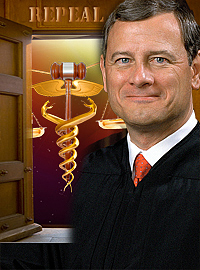| John Roberts and ObamaCare, Part II |
 |
|
By Ashton Ellis
Thursday, December 05 2013 |
When Chief Justice John Roberts changed his vote – and his reasoning – to uphold ObamaCare in NFIB v. Sebelius (2012), he drew the ire of many conservatives. His most vocal critics were the four Supreme Court justices whose majority opinion became the dissent after Roberts jumped ship. The quartet of Justices Scalia, Kennedy, Thomas and Alito was angry that Roberts decided to modify ObamaCare instead of striking down its deficient parts as unconstitutional, and for good reason. “The Court today decides to save a statute Congress did not write,” argued the dissenters. Sometime in 2014, the Chief Justice may get a chance to redeem himself. The vehicle is likely to be a legal challenge to ObamaCare spearheaded by Scott Pruitt, Oklahoma’s Attorney General. By now, no one disputes that health insurance plans under ObamaCare are more expensive than before. To make them more affordable, ObamaCare’s drafters empowered the Internal Revenue Service (IRS) to issue tax credits to help pay for part of the premium. To pay for those credits, the IRS can also fine businesses that do not purchase an ObamaCare-approved insurance plan. But according to ObamaCare’s text, the IRS doesn’t have jurisdiction in Oklahoma to do either. That’s because Section 1311 of the health law says that subsidies and penalties can occur only in states that run their own ObamaCare exchanges. They aren’t applicable in states where the exchange – Healthcare.gov – is operated by the federal government. To date, only 14 states plus the District of Columbia run their own exchanges, making them the only places in the country where citizens are eligible for subsidies. Those obliged to buy a health insurance plan in one of the 36 other states – like Oklahoma – get nothing. This is no drafting error. ObamaCare’s architects made a strategic decision to dangle federal subsidies as the reward for a state assuming the costs of running an exchange. The ploy was cynical in the extreme. If successful, it would allow the feds to off-load the cost of exchanges to the states, while state politicians could claim credit for reducing the sticker shock of the insurance it markets. Oklahoma and 35 other states weren’t interested. That didn’t stop the IRS. Earlier this year, the agency issued an interpretive ruling that said it would make subsidies available to all exchange users, regardless of where they live. So, why isn’t Oklahoma happy to let the feds pay for both its exchange and part of its citizens’ premiums? Because acquiescing to the spending means exposing Oklahoma businesses to the IRS penalties that pay for the largesse. Besides, allowing the feds to impose the terms anyway – against the plain meaning of the law – would be a huge blow to the rule of law and state sovereignty. If Oklahoma prevails, the vast majority of Americans would face huge increases in health insurance premiums without any way to make them financially palatable. Millions of voters would likely channel their disgust into the 2014 elections, sending another Tea Party wave onto Capitol Hill. Which brings us back to John Roberts. In the NFIB case, Roberts showed himself unwilling to strike down ObamaCare primarily on philosophical grounds, namely federalism. Instead, the Chief Justice employed his prodigious lawyerly skills to craft an alternative justification for the law, albeit one not mentioned in ObamaCare’s text. Considering his career and temperament, this is perhaps understandable. Prior to serving as a judge, Roberts’ background was as a litigator, not a scholar. In other words, Roberts seems more comfortable tinkering with the details rather than debating first principles. But if the Oklahoma case gets to the Supreme Court soon, Roberts won’t be asked to make a constitutional-philosophical decision. Instead, he will be asked to decide how much latitude the IRS gets when interpreting a particular statute. The distinction might be enough to convince Roberts to join the conservative bloc. In another part of his NFIB opinion that gets much less attention, Roberts struck down the part of ObamaCare that penalized states for refusing to expand Medicaid because doing so exceeded Congress’ authority. It’s plausible that a similar argument could persuade Roberts to strike down an IRS rule that clearly goes against the letter and spirit of the law it claims to interpret. Such a scenario would drip with irony. The Chief Justice who twisted ObamaCare into a pretzel to save it from oblivion could turn out to be the same one that opens the door to its outright repeal. After NFIB, voters decided to give ObamaCare a chance thanks to John Roberts’ blessing. But if the Chief Justice holds that ObamaCare must be implemented according to its own terms, Americans will finally find out what’s in it, just in time for the next election. |
Related Articles : |
























